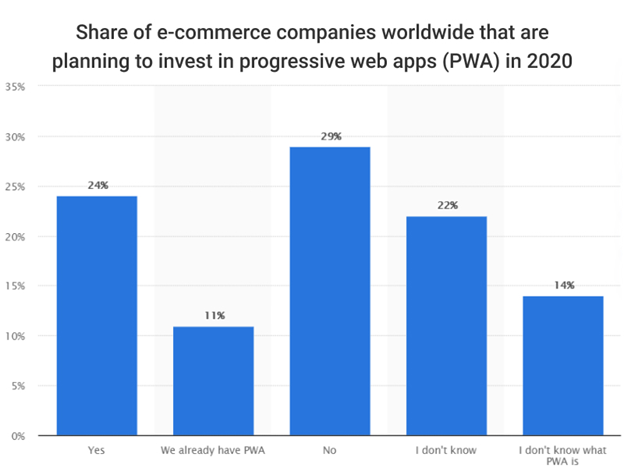Sushant Gupta
Is an Online Geek. Who Diggs out the different ways for how can we make money online. He has been earning through e-commerce sites for years and wants to share his experience with all.
Twitter, tinder, Forbes, Pinterest, etc., are some of the world’s top leading enterprises, ruling the digital world via progressive web apps. Although...

Image Credits: pixabay
Twitter, tinder, Forbes, Pinterest, etc., are some of the world’s top leading enterprises, ruling the digital world via progressive web apps. Although coined in 2015 by Google, the PWAs have become a preferred choice for diverse business enterprises in less than a decade.
Cost-effectiveness and outstanding performance both with and without an internet connection are just a few of the loads of exciting features an enterprise enjoys via PWAs. However, are progressive web apps equally beneficial for small and medium-sized business enterprises?
Well, the answer is an obvious yes. And you need not take me for granted. This blog discusses the top 7 benefits of PWAs for small businesses. Before you proceed to them, look at this interesting infographic and find out which category you belong to.

Source: Statista
The chances are high that you are a part of 24% as right now, you are weighing your options. Let us start with the basics of PWAs to ensure zero confusion as you proceed forward.
The term PWAs stands for Progressive Web Apps and was originally coined by the tech giant Google. They are built using standard web technologies like HTML (Hypertext Markup Language), CSS (Cascading Style Sheets), and JavaScript and delivered through the web. PWAs have the added advantage of working on any platform using a standard complaints browser.
Here are some interesting stats related to PWA as per the top 30 PWA Benchmarking Study:
Well, the above stats give a clear hint on how SMEs could leverage PWAs for outstanding benefits.

The penchant for a quick-loading software application is only increasing every day. In fact, as per web development stats, 47% of users look for alternative options when a page takes more than 2 seconds to load. PWA decreases the page-loading time in two main ways.
Thus, once a user has entered your page, he/she can make repeated visits in much less time.
Visiting an app store to download a new application just because you have heard of it and want to gain first-hand experience can be tiresome at times. What’s even more disappointing is that most of these applications end in recycle bins right after first use.
In contrast, a PWA is discovered by a user more naturally with browsing. Once the user starts visiting the app regularly, then he/she is offered the option to install the app over the home screen.

PWAs offer robust performance even without an internet connection. The users can perform desired actions, and the activities get stored in the form of pending requests over the cache. Thus, once the user gets online, the app begins to perform the pending actions.
It enhances the reliability of the PWAs, as actions get delayed only for some virtual time till the user is offline or without a stable & secured internet connection.

A significant setback with simple web apps was that they didn’t come with push notifications. There wasn’t much option for the business managing committee to bring back a lost user. PWAs allow the managing team to utilize web push notifications and offer greater personalization to page visitors.
Multiple payment options that work on different browsers and platforms can get integrated over the progressive web app the firm has invested in. With secured payment and a simple checkout process, the web app successfully enhances the conversion rate.
By now, you won’t even find it surprising that the conversion rate of PWAs is 36% higher than the native apps as per the top 30 PWA benchmark studies. Pure Formulas, a medium-sized enterprise with a revenue of $36.4 million, reported a 14% increase in conversion rate after PWA implementation.

Going for native app development proves dear and limits the number of users as the app is available on a single platform. On the other hand, SMEs can hire web app developers to reach a greater audience at a lower development cost.
Being platform-independent PWAs requires lesser cost and time of development and doesn’t burn a hole in the pocket for maintenance activities. Firms also save on sharing commission over app-based purchases necessary to pay to app platforms in case of the native mobile apps.
Smartphone users have a tendency to delete apps that drains battery life, consumes too much space, or when the app fail to appeal to them. PWAs are not downloaded from the play store or app market. The users find the app naturally, and the installation option gets offered only when the user becomes a frequent visitor of the website.
PWAs require less memory space of the device and offer high performance to the users. Thus, app retention is significantly higher when compared to random app downloads.
That was all about the top benefits of investing in PWAs. However, it will be insincere to keep you in the dark about the cons of investing in PWAs. Yes, you read that right. There are a few cons that you must get well aware of.
Overall Progressive web apps are an excellent choice for small and medium-sized enterprises to invest in. Connect with PWA development companies in India to experience affordable development services.
Wish you luck with the programming project.
Suggested:
The Perfect Chemistry of Progressive Web Apps and Magento Ecommerce.
The information you’ve shared in this blog is very remarkable. Thanks for sharing such useful information.
Thanks peter.
Hey Aria, I’m follow you since 5 months your article really helping me for my skills improvement in blogging. Thanks please keep upto date like this..
Sure, Thanks.